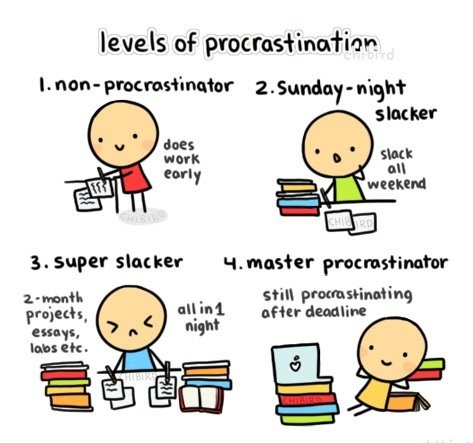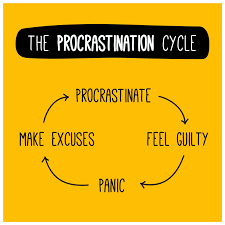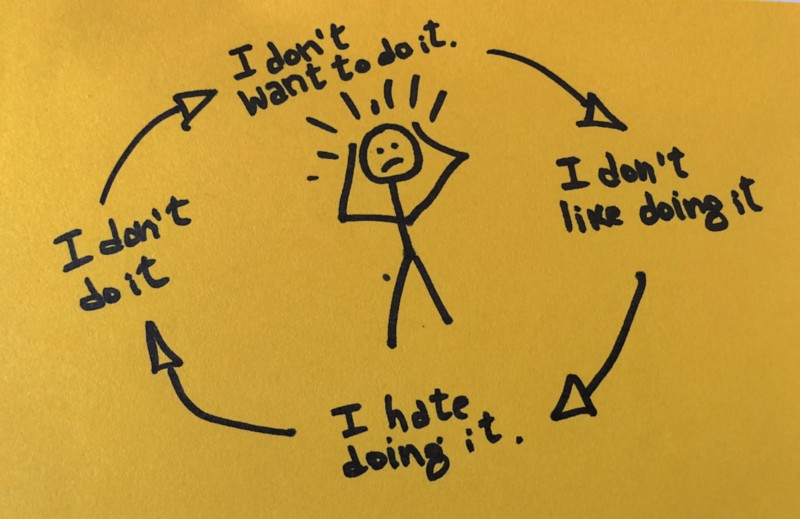You know that feeling of dread when you have a long task to do? The task seems so daunting and it’s hard to get started. That is the feeling of procrastination. Procrastination can be debilitating because it pushes tasks out, which makes them harder to accomplish than if they had been done regularly. In this blog post, we will talk about why people procrastinate (why do I procrastinate so much), how to fix it and what experts say on the topic!
Contents
Understanding Procrastination

Procrastination is the act of delaying or postponing a task. It can also be seen as putting off something that needs to happen now in favor of doing other things, but it’s more than just being lazy! There are different forms and levels of procrastination, such as:
- Perfectionism (trying to make it perfect)
- Laziness (not wanting to do anything at all)
Types Of Procrastinators
People are either time-oriented or task-oriented.
- Task-oriented people wait until the last minute to do something, but they get it done.
- Time-oriented people procrastinate by doing other things that aren’t important because they don’t want to start on a project even if there is some time left before the deadline!
Types Of Procrastination

There are two types of procrastination: chronic and acute.
Chronic Procrastination
Chronic procrastination is when the person has been struggling to address the problem for a long time. It can be caused by different factors, such as perfectionism or low self-esteem.
Acute Procrastination
Acute procrastination is when the person only postpones tasks occasionally and it’s usually due to stress or lack of time. It could be the first time you are experiencing it.
Degrees Of Procrastination
There is a spectrum of procrastination, with different people displaying different levels of it:
Mild Degree (tasks are postponed but get done in the end)
The person only delays tasks occasionally and it doesn’t harm their life.
Moderate Degree (task avoidance and frequent distractions)
The person delays tasks often and it harms their work.
Severe Degree (procrastination interferes with daily life)
The person is unable to function properly because they are constantly delaying tasks that need to be done. This affects their life negatively in many ways – it can cause health problems too!
Case Example

Professor Pychyl explains the severity of procrastination based on how it impacts our lives: “If you’re not doing what’s important to you now if you’re not taking care of your health or engaging in leisure activities that refresh your mind and increase productivity later on, then it’s very serious.
There may be some people who can delay gratification for the sake of achieving a long-term goal (e.g., meditating daily because they want increased mindfulness), but not many. For the most part, if people are chronically delaying gratification (e.g., by spending too much time on social media) it’s because they don’t care about their future selves.”
The Costs Of Procrastination
Every task you postpone will cost you time and money in the long run. You can see this as an investment (in yourself or your business), but it is still very important to act on tasks right away. If not, costs may accumulate over time:
Time Cost
The longer you wait to do a task, the more time it will take. This is because you will have to spend time getting back into the swing of things and may even have to redo what you had done before.
Money Cost
If you are a small business owner, procrastination can lead to missed opportunities and lost revenue. If you are an employee, it can lead to missed deadlines and negative feedback from your manager or employer.
Tackling Procrastination

Reasons Why You Procrastinate And Measures
There are many reasons why people procrastinate, but here are the nine most common ones:
Lack of Motivation
This is the most common reason for procrastination. The person doesn’t feel inspired to do the task and sees it as a burden.
Measure: Find a way to increase your motivation for the task. This could be through positive reinforcement, setting smaller goals, or breaking the task down into more manageable parts.
Fear Of Failure
The person is afraid of not succeeding and doesn’t want to feel the disappointment or embarrassment that may come with it.
Measure: Talk to someone about your concerns and learn how to deal with them. You may also need to set smaller goals or break the task into more manageable parts, as well as break down any negative thoughts you have (e.g., “I can’t do this”/”This is too hard”).
Lack Of Focus Or Concentration
The person is easily distracted by other tasks or activities that they find more interesting.
Measure: Keep your phone away from you while working on the task, put a time limit for distractions (e.g., 20mins), and reward yourself when you are done with what needs to get done first. You can also make use of mindfulness apps like Headspace.
Low Self-Efficacy Or Lack Of Confidence
The person doesn’t think they can do the task properly or is very hard on themselves when it comes to mistakes and failure.
Measure: Talk to someone about your fears, learn how to deal with them (e.g., “What’s the worst that can happen?”), and set smaller goals.
Perfectionism
The person wants everything to be perfect before they start the task and this often leads to delaying it.
Measure: Set a time limit for how long you will spend on the task, break the task down into more manageable parts, and learn to accept mistakes as part of the process.
Lack Of Ability Or Knowledge
The person doesn’t feel prepared to do the task and so delays it for another time when they may have more information or skills at their disposal.
Measure: Seek help from someone knowledgeable about what needs to get done, break down any tasks that you find difficult into smaller parts, and set a time limit for learning new information.
Lack Of Organizational Skills Or Structure
The person has trouble keeping track of tasks or projects that need to get done and is not good at planning (e.g., setting due dates) because they don’t like schedules.
Measure: Set up calendar alerts, prioritize tasks according to what is most important/urgent, and set deadlines for yourself.
Perfectionism And Organizational Problems Combined
This person wants everything to be perfect while also having organizational problems. This makes it difficult or time-consuming to get things done promptly.
Measure: Set up calendar alerts, prioritize tasks according to what is most important/urgent, and set deadlines for yourself. You may also need to seek help from a professional organizer or therapist who can assist you with getting your life more organized.
Time Pressure Or Urgency
The person feels like they don’t have enough time to do the task or that it has to be done right now.
Measure: Set a time limit for how long you will spend on the task, break the task down into more manageable parts, and learn to accept that some tasks can’t be completed in a short amount of time.
Practical Tips To Tackle Procrastination

There are different ways to tackle procrastination, depending on the cause and severity of it.
If you have a mild degree of procrastination, here are some measures you can take:
- Set realistic deadlines for tasks
- Break down big tasks into smaller ones
- Reward yourself after completing tasks
- Use a timer to stay focused
If you have a moderate degree of procrastination, here are some measures you can take:
- Set stricter deadlines for tasks
- Remove distractions from your environment
- Create a task list and stick to it
- Prioritize important tasks
If you have a severe degree of procrastination, here are some measures you can take:
- See a professional (therapist, counselor, etc.)
- Set long-term goals and short-term goals
- Create a daily routine
- Measure your progress regularly
Experts On Procrastination

There is no one cause of procrastination, but there are many theories that try to explain why people do it:
“When we study this issue in our laboratory at Carleton University (Ottawa, Canada), we come up with a variety of possible explanations for why people procrastinate. One reason may be that people are perfectionists and do not want to start a task until they know it will be done perfectly.
Another explanation is that some people simply do not have the skill set to organize their time and activities well, so they put off tasks until the last minute. Finally, some people may procrastinate because they feel overwhelmed by a task and do not know where to start.” – Professor Pyschyl
“If you are looking for the silver bullet, I don’t have it. If what I write works 30% of the time, then consider yourself lucky—and if not, think of me as a brilliant 30%.” – Tim Urban
“People have different ways of coping with the anxiety that may arise when faced with an important task. Some people cope by procrastinating—putting off starting or finishing until tomorrow (or next week, or next month). Other people cope by working diligently on their tasks every day; they are not prone to procrastinate, and they often get more done than the people who avoid their work by putting it off.” – Dr. Ferrari
Case Study
Sam Pays The Price Of Putting Off Important Tasks Until The Last Minute

Sam is a college student who’s been procrastinating on studying for his midterms ever since they were announced two weeks ago. He hasn’t prepared at all, and now it’s crunch time where he has to cram in as much information as possible. He hasn’t even bought his textbooks yet, and he’s going to fail miserably if he doesn’t get started soon!
As a result of his procrastination, Sam is feeling overwhelmed and stressed. He’s not sleeping well, he’s eating unhealthy foods, and he’s been having trouble focusing in class. His grades have started to drop as a result of his poor studying habits, and he knows that if he doesn’t do something soon, he’ll be in serious trouble.
Sam decides to go to the library and get started studying for his midterms, but he ends up wasting time watching TV instead of focusing on his books. He goes back again tomorrow, only this time he spends more than three hours playing video games before finally getting down to business. By that point it was too late; Sam was too tired to study.
End Result: Sam’s procrastination is costing him his grades, and it could cost him his future if he doesn’t change soon!
Talking To A Professional
If you’re struggling with chronic procrastination, it might be a good idea to talk to a professional. They can help you identify the root of the problem and give you advice on how to overcome it.
Conclusion
Procrastination is a common problem that many people face. It can cause stress, anxiety, and guilt, and can lead to poor work performance and low self-esteem. There are many ways to tackle procrastination, depending on the cause and severity of it. If you’re struggling with chronic procrastination, it might be a good idea to talk to a professional.
If you are looking for affordable Online Counseling MantraCare can help: Book a trial therapy session


